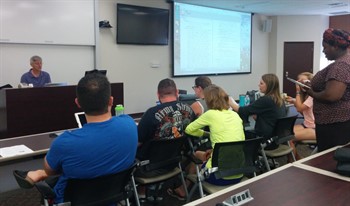Dr. Timothy Fior, MD, DHt, a physician at a local integrative practice, spoke to students in the Homeopathy Club earlier this month about a case of gastritis that was first diagnosed as possible stomach cancer.
While exploring the case, students used MacRepertory, a program unique to the field of homeopathy that helps physicians find remedies based on a patient’s specific symptoms. After finding a potential remedy, students and clinicians cross-referenced it  with the Materia Medica, a comprehensive listing of homeopathic clinical experience and proving reports. A proving is like a phase I drug trial where medicines are given to healthy people to see what symptoms they produce. Symptoms are then recorded in great detail for other physicians to reference.
with the Materia Medica, a comprehensive listing of homeopathic clinical experience and proving reports. A proving is like a phase I drug trial where medicines are given to healthy people to see what symptoms they produce. Symptoms are then recorded in great detail for other physicians to reference.
“There is usually one peculiar symptom that becomes the key that gets you through the door to find the right remedy,” said Dr. Fior, who is also a faculty member at NUHS and teaches Homeopathy 3 in the naturopathic medicine program.
The case he discussed involved a 53-year-old woman, who called urgently about an inability to eat or drink without pain and vomiting. The patient had various symptoms that included an incessant feeling of coldness, pain that was only relieved while on all fours and a low tolerance for alcohol. Students also evaluated the patient’s mental/emotional state, which was impacted by suicidal thoughts and the death of her son two years prior.
A CT scan performed in a hospital emergency room showed extensive gastric wall thickening that led several physicians to conclude that she likely had a form of stomach cancer called linitis plastic, which is usually fatal within 3 to 12 months. The patient refused an endoscopy and biopsy at the local hospital and instead decided to travel to the Mayo Clinic in Minnesota for further diagnosis and treatment. The patient also came to Dr. Fior for a second opinion. He reviewed the scans and evaluated the patient’s other symptoms, looking for characteristic indicators particularly regarding her mental state and stomach issues, which would lead him to a suitable homeopathic prescription.
By entering the patient’s various symptoms into the MacRepertory program, Dr. Fior was able to find a remedy called Conium maculatum or hemlock that was given in a 30C and then 200C dilution. Hemlock has ancient roots, and in fact Socrates was sentenced to death in ancient Greece by ingesting hemlock, a highly poisonous plant when used in its crude, non-homeopathic form. The Materia Medica confirmed that the remedy Hemlock or Conium matched several of the patient’s symptoms, specifically one involving relief of stomach pain while on all fours.
After taking the remedy, the patient saw immediate relief in her pain symptoms and was able to eat again without pain and vomiting. An endoscopy and stomach biopsy at Mayo Clinic later showed no signs of stomach cancer to the surprise of the doctors at the clinic.
The patient was convinced that the remedy helped heal a very serious and potentially life threatening condition. “Along with treating the stomach pain and vomiting, the patient also experienced recovery in her mental state and regained the will to live again,” Dr. Fior said.
Dr. Fior presented the case to demonstrate how database tools like MacRepertory and the Materia Medica can be used to find the best remedy for patients. “I also wanted to show students how rare, unusual or characteristic symptoms obtained by a careful history and physical exam can be the key to helping a patient with a serious condition,” Dr. Fior said.



0 Comments